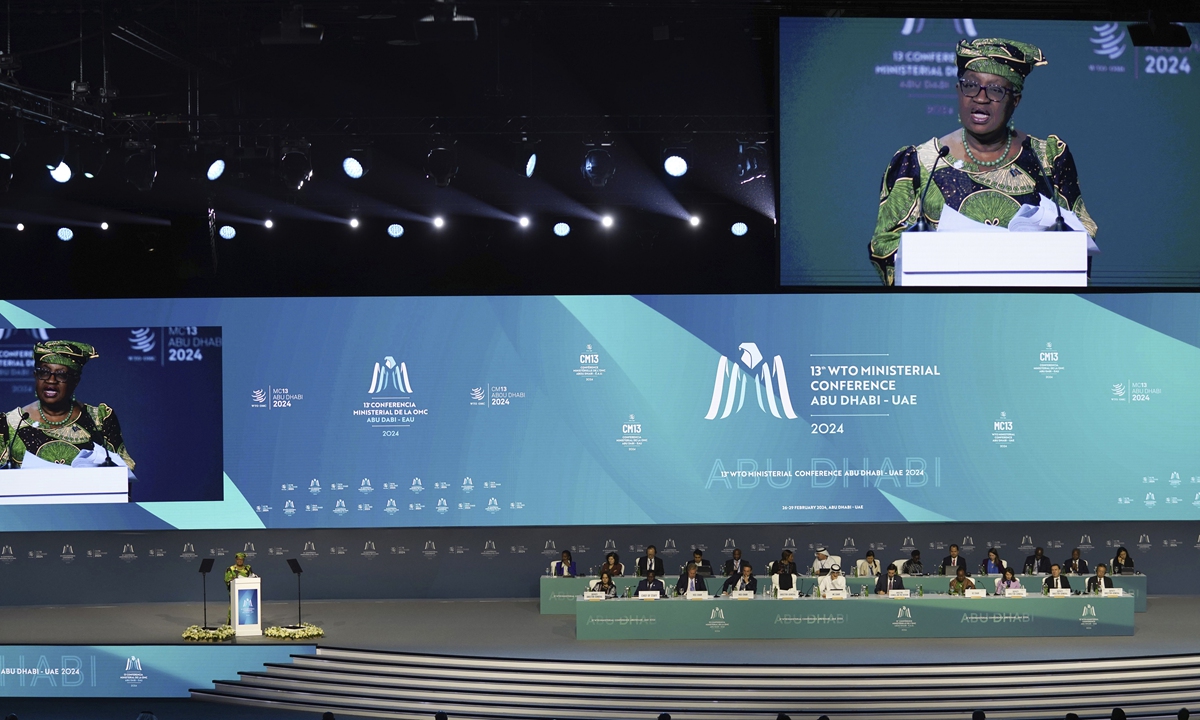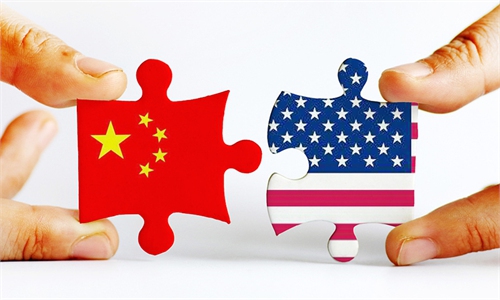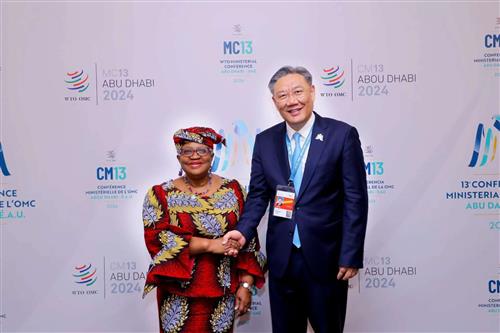US urged to correct unilateralism, bullying trade practices amid key WTO meeting
Beijing promotes cooperation, as Washington engages in protectionism

The World Trade Organization (WTO) Director-General Ngozi Okonjo-Iweala speaks at a WTO summit in Abu Dhabi, United Arab Emirates, on February 26, 2024. The WTO opened its biennial meeting Monday in the United Arab Emirates as the bloc faces pressure from the US and other nations ahead of a year of consequential elections around the globe. Photo: VCG
China's Commerce Ministry said on Monday that China firmly safeguards the multilateral trading system and attaches great importance to the work of the WTO, while slamming the US for violating WTO rules and engaging in unilateral trade bullying, which seriously undermines the global trade order and hurts the common interests of WTO members.
The comments came as the WTO on Monday officially kicked off the 13th Ministerial Conference in Abu Dhabi, the United Arab Emirates, as it seeks to tackle a wide range of issues, including reforms, fishing subsidies and digital trade, amid growing uncertainty in global trade.
China and the US, the world's two biggest economies, demonstrated starkly different approaches to global multilateral trade, with Chinese officials spearheading efforts to reform the WTO and supporting various works of the top trade body, while the US engaging in protectionism, economic bullying and finger-pointing, experts said.
Though the WTO faces increasing challenges posed by members like the US that have called WTO's relevance into question, the global multilateral trade body continues to enjoy firm support from a vast majority of its members, including China, and is more critical than ever in helping navigate a tumultuous period in global trade by championing cooperation among members, experts noted.
The 13th WTO Ministerial Conference comes at a crucial moment, as both the WTO and global trade face tremendous challenges and risks. For the WTO, as some members led by the US openly disregard its rules and even work to cripple its core functions such as the Appellate Body, its influence and relevance have been questioned. Meanwhile, global trade is also facing a rising tide of anti-globalization, protectionism and economic nationalism, while geopolitical conflicts also weigh on trade.
Speaking at the conference on Monday, Chinese Commerce Minister Wang Wentao said the Chinese government firmly safeguards the multilateral trading system and attaches great importance to the work of the WTO, and will work with all parties to promote the success of this ministerial meeting and jointly build an open world economy.
Wang also said China will steadily expand institutional opening-up, cut the negative list for foreign investment access, implement the comprehensive lifting of restrictions on foreign investment access in the manufacturing sector, and ensure equal treatment for foreign-invested enterprises. China is confident that it will push China's economy forward steadily in a new stage of high-quality development and provide lasting impetus for world economic and trade growth, he said.
Huo Jianguo, a vice chairman of the China Society for World Trade Organization Studies in Beijing, told the Global Times on Monday that China has always firmly supported multilateral trade organizations with practical actions, but under the interference of US protectionism, multilateral trade organizations are indeed relatively fragile and it is difficult to reach a satisfactory agreement.
US bullying
While final outcomes of the ministerial conference remain to be seen, one striking trend emerged: even as China and other developing countries are promoting sensible reforms of the WTO to make it more inclusive and influential, the US continues to pose hurdles for any meaningful reforms and engage in protectionism and economic bullying.
Such a difference was clear even before the WTO ministerial conference started. On Sunday, Wang met with WTO Director-General Ngozi Okonjo-Iweala in Abu Dhabi and stressed that China stands ready to work with all parties to push for more pragmatic outcomes of the conference. Specifically, China supports resuming the normal operation of the dispute settlement mechanism, formulating a work plan for agricultural negotiations, responding to the food security demands of the least developed countries and net food-importing developing countries, and promoting the conclusion of the second phase of the fishery subsidy agreement.
Also on Sunday, Wang and Okonjo-Iweala attended the China Round Table on WTO accessions, which aims to help developing members, especially the least developed countries, better integrate into the multilateral trading system. "Many thanks to China for supporting this sharing of experiences and learning for newly acceding members like Comoros and Timor Leste and the 22 countries in the accession pipeline - of which one third are Arab countries," Okonjo-Iweala said.
"China is a member of the multilateral mechanism, so we hope that the WTO can reach a consensus so that the organization can operate fully, and we can discuss the reform of the WTO mechanism," Li Xiangyang, director-general of National Institute of International Strategy at the Chinese Academy of Social Sciences, told the Global Times on Monday, while highlighting damages caused by the US on the WTO, including blocking the appointment of new judges to the Appellate Body, a crucial function of the WTO that resolves disputes among members.
In stark contrast to China's positive role, the US continues to stir up trade tensions. Ahead of the WTO Ministerial Conference, the Office of the US Trade Representative released a report on China's WTO compliance, which was filled with accusations against China. "China remains the biggest challenge to the international trading system established by the World Trade Organization," US Trade Representative Katherine Tai said.
China's Ministry of Commerce slammed assertions in the report as baseless. The US side criticizes China's economic and trade policies with baseless and arbitrary standards, falsely calls China's legitimate trade measures "economic coercion," and confuses right and wrong, which "fully reflects the unilateralism and bullying behavior of the US," the ministry said on Monday.
The Ministry further pointed out that in recent years, the US, with its "America first" agenda, violated WTO rules, engaged in unilateral economic bullying, formulated discriminatory industrial policies, which disrupted global supply chains, seriously undermined the global trade order and hurt the common interests of WTO members.
On the sidelines of the WTO meeting on Monday, Wang met with Tai and had professional and in-depth exchanges on bilateral and multilateral trade issues of mutual concern. Wang also expressed China's serious concerns about the US' additional tariffs on China and Taiwan-related economic and trade issues, according to the Chinese Commerce Ministry.
"The US has always said one thing and done another. The current position of the WTO is directly related to the US. The US took the lead in paralyzing the dispute settlement mechanism," Huo said, noting that the US has also violated many WTO rules by wantonly imposing tariffs, taking protectionist actions and enacting domestic laws in contradiction of multilateral trade rules and norms. "In this situation, the US is not qualified to accuse China at all."



